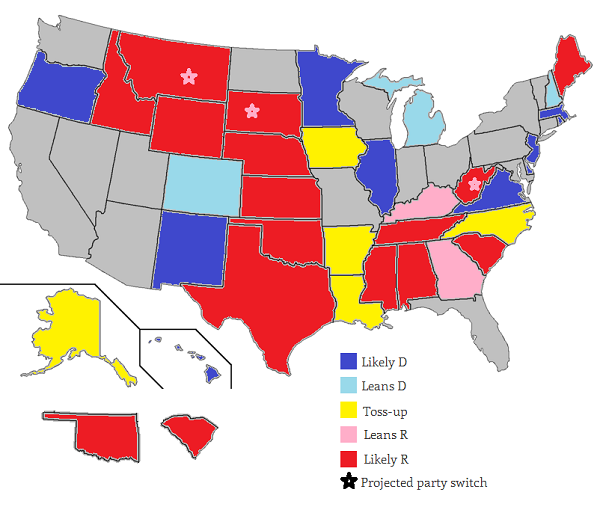As we noted last week, U.S. Senate candidate Joni Ernst’s lopsided victory in the Iowa Republican primary suggested that Ernst is poised to make this a real race. The GOP may be at war with itself in some corners of the country (witness House Majority Leader Eric Cantor’s stunning loss to a tea party challenger in Virginia last night), but Republican unity is alive and well in Iowa: Endorsements from Mitt Romney and Sarah Palin gave Ernst street cred with both the establishment and populist wings of the party.
Videos by Rare
The polls since then have borne this out; Loras College, Rasmussen and Vox Populi have all released polls showing Ernst leading Democratic Rep. Bruce Braley. It emerged in April that Braley had been caught on tape at a January at a fundraiser in Texas warning a group of trial lawyers that Chuck Grassley, Iowa’s senior senator, could be Senate Judiciary Committee chairman if Republicans win the Senate — and disparaging Grassley as “a farmer from Iowa who never went to law school.” Iowa, needless to say, has more farmers than lawyers. The gaffe made Braley look like he could lose; the primary victory and subsequent polls make Ernst look like she can win. This race now moves from Leans Democrat to Toss-up.
In an update to his Senate forecast this week, number-crunching guru Nate Silver added some caveats on Iowa: He questions the reliability of these particular polling companies (fair enough, but they’re all we’ve got right now) and observes that “candidates sometimes get a temporary bounce from the favorable publicity surrounding a primary win, which then fades.” Silver has downgraded Braley’s chances of victory, but only from 75 percent to 60 percent — the same as the chances he gives Democratic incumbent Mark Udall in Colorado, which we still rate as leaning toward the Democrat.
Part of what’s going on here is that Silver is setting odds on the result in November, while we’re taking a snapshot of the race as it stands. But Udall has the advantage of incumbency (Braley and Ernst are vying for the seat that retiring Senator Tom Harkin is leaving open), and while the polls are close in Colorado, Udall’s opponent, Cory Gardner, has yet to come out ahead in any of them; until he does, it’s hard to justify putting Colorado in the same category as Iowa. It may be that Silver’s quantitative model is missing things that are easier to see with a more qualitative analysis.
That said, qualitative analysis can go awry, and in Montana the quants have a good case. Writes Silver:
Montana is one state where statistical models and qualitative forecasters disagree. Whereas groups like Cook Political Report characterize the race as merely leaning toward the Republican, Rep. Steve Daines, the polling-driven models have him as almost certain to win.
The case for the Democrat, the appointed incumbent Sen. John Walsh, would rely on citing Montana’s recent political history (Democrats have performed well and closed well in non-presidential races there) and Walsh’s political pedigree (he is Montana’s former lieutenant governor). It seems like a stretch to us (and may result partly from the erroneous assumption that all incumbents are equal, when in fact appointed incumbents like Walsh run far worse than elected ones do). In any event, Walsh will need to make up a lot of ground in the polling. We have Walsh’s chances at 15 percent for now, down from 20 percent in March. He and Daines just won their primaries, and if Walsh doesn’t see some improvement in his polling soon, Democrats may need to write the race off.
Count ours as one qualitative analysis that sides with Silver; we’ve had Montana painted solid red from the start of this series, filed with South Dakota and West Virginia as an easy GOP pick-up. With those three states in the bank, Republicans need to net three more seats to flip the Senate — and the state of the race in Iowa means that the list of most promising targets has just expanded from four to five.



